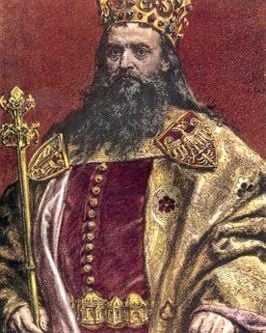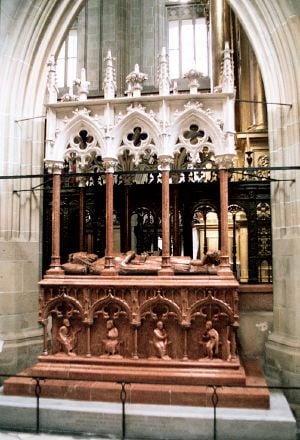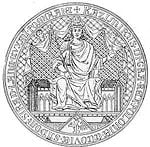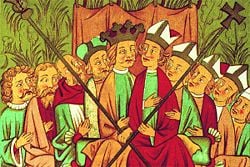Difference between revisions of "Casimir III of Poland" - New World Encyclopedia
(import, credit, category) |
(dates) |
||
| Line 1: | Line 1: | ||
: ''This article is about the 14th century Polish king. For other uses, please see [[Casimir]]''. | : ''This article is about the 14th century Polish king. For other uses, please see [[Casimir]]''. | ||
[[Image:CasimirtheGreat.jpg|266px|right|thumb|Kazimierz III the Great by [[Jan Matejko]]]] | [[Image:CasimirtheGreat.jpg|266px|right|thumb|Kazimierz III the Great by [[Jan Matejko]]]] | ||
| − | '''Casimir III''', called '''the Great''' ([[Polish language|Polish]]: '''''Kazimierz Wielki'''''; | + | '''Casimir III''', called '''the Great''' ([[Polish language|Polish]]: '''''Kazimierz Wielki'''''; 1310 – 1370), [[List of Polish rulers|King of Poland (1333-70)]], was the son of King [[Władysław I the Elbow-high]] and Jadwiga of [[Gniezno]] and [[Greater Poland]]. |
== Biography == | == Biography == | ||
| Line 12: | Line 12: | ||
Kazimierz is the only Polish king who both received and has kept the title of '''the Great''' in Polish history ([[Boleslaw I Chrobry]] was once also called ''the Great'', but not today), and the title is well deserved. When he received the crown, his hold on it was in danger, as even his neighbours did not recognise his title and instead called him "king of [[Kraków]]". The [[economic system|economy]] was ruined, and the country was depopulated and exhausted by war. Upon his death, he left a country doubled in size (mostly through the addition of land in today's [[Ukraine]], then the Duchy of [[Halicz]]), grew prosperous, wealthy and had great prospects for the future. Although he is depicted as a peaceful king in children's books, he in fact waged many victorious wars and was readying for others just before he died. | Kazimierz is the only Polish king who both received and has kept the title of '''the Great''' in Polish history ([[Boleslaw I Chrobry]] was once also called ''the Great'', but not today), and the title is well deserved. When he received the crown, his hold on it was in danger, as even his neighbours did not recognise his title and instead called him "king of [[Kraków]]". The [[economic system|economy]] was ruined, and the country was depopulated and exhausted by war. Upon his death, he left a country doubled in size (mostly through the addition of land in today's [[Ukraine]], then the Duchy of [[Halicz]]), grew prosperous, wealthy and had great prospects for the future. Although he is depicted as a peaceful king in children's books, he in fact waged many victorious wars and was readying for others just before he died. | ||
[[Image:Pieczec Kazimierz Wielki.jpg|right|thumb|150px|Royal seal of Kazimierz the Great.]] | [[Image:Pieczec Kazimierz Wielki.jpg|right|thumb|150px|Royal seal of Kazimierz the Great.]] | ||
| − | Kazimierz the Great built many new [[castle]]s, reformed the Polish [[army]] and Polish [[Civil law (private law)|civil]] and [[criminal law]]. At the [[Sejm]] in [[Wislica]], March 11, | + | Kazimierz the Great built many new [[castle]]s, reformed the Polish [[army]] and Polish [[Civil law (private law)|civil]] and [[criminal law]]. At the [[Sejm]] in [[Wislica]], March 11, 1347, he introduced salutary legal reforms in the jurisprudence of his country. He sanctioned a code of laws for Great and Little Poland, which gained for him the title of "the Polish Justinian"; and he also limited the [[interest rate]] charged by Jewish money-lenders to Christians to 8 % per annum, a rate of 108-180% being previously common. (Owing to extremely high and unstable inflation rates, significantly lower interest rates would result in net losses for the lender. For example, in 1264 the King of Austria had capped Jewish money-lenders' interest rates at 8 dinars on the talent, approximately 170% at the time). This measure was passed after consistent pressure by the [[szlachta]] of the [[Sejm]] (who were primary clients of Jewish money-lenders). This measure was to the detriment of the King, who later affirmed that Jews be allowed to loan on interest as "property" of the King, in order to supplement the King's income when needed. He founded the [[University of Kraków]], although his death stalled the university's development (which is why it is today called the "Jagiellonian" rather than "Casimirian" University). |
He organized a meeting of kings at Kraków (1364) in which he exhibited the wealth of the Polish kingdom. | He organized a meeting of kings at Kraków (1364) in which he exhibited the wealth of the Polish kingdom. | ||
| Line 19: | Line 19: | ||
In order to enlist the support of noblemen ([[szlachta]]), especially the military help of [[pospolite ruszenie]], Kazimierz was forced to give up important privileges to their caste, which made them finally clearly dominant over townsfolk ([[burgher]]s or ''mieszczanstwo''). | In order to enlist the support of noblemen ([[szlachta]]), especially the military help of [[pospolite ruszenie]], Kazimierz was forced to give up important privileges to their caste, which made them finally clearly dominant over townsfolk ([[burgher]]s or ''mieszczanstwo''). | ||
| − | [[Image:Wiec Kazimierz Wielki.jpg|thumb|left|250px| | + | [[Image:Wiec Kazimierz Wielki.jpg|thumb|left|250px|14th century|14th-century ''[[wiec]]'', in the reign of Kazimierz the Great.]] |
| − | In | + | In 1335, in the "treaty of [[Trenčín]]", Kazimierz relinquished "in perpetuity" his claims to [[Silesia]]. |
| − | In | + | In 1355 in [[Buda]] Kazimierz designated Louis of Anjou (Louis I of Hungary) as his successor. In exchange, the szlachta's tax burden was reduced and they would no longer be required to pay for military expeditions expenses outside Poland. Those important concessions would eventually lead to the ultimately crippling rise of the unique [[Nobles' Democracy|nobles' democracy]] in the [[Polish-Lithuanian Commonwealth]]. |
His second daughter, Elisabeth, Duchess of Pomerania, bore a son in 1351, named [[Kazimierz of Pomerania]] after his maternal grandfather. He was slated to become the heir, but did not succeed to the throne, dying childless in 1377, 7 years after King Kazimierz. He was the only male descendant of King Kazimierz who lived during his lifetime. | His second daughter, Elisabeth, Duchess of Pomerania, bore a son in 1351, named [[Kazimierz of Pomerania]] after his maternal grandfather. He was slated to become the heir, but did not succeed to the throne, dying childless in 1377, 7 years after King Kazimierz. He was the only male descendant of King Kazimierz who lived during his lifetime. | ||
| Line 28: | Line 28: | ||
Also, his son-in-law Louis of Bavaria-Brandenburg was thought as a possible successor. However, he was not deemed very capable, and his wife had died already in 1357, without children. | Also, his son-in-law Louis of Bavaria-Brandenburg was thought as a possible successor. However, he was not deemed very capable, and his wife had died already in 1357, without children. | ||
| − | Kazimierz had no sons. Apparently he deemed his own descendants either unsuitable or too young to inherit. Thus, and in order to provide a clear line of succession and avoid dynastic uncertainty, he arranged for his sister Elisabeth, Dowager Queen of Hungary, and her son Louis king of Hungary to be his successors in Poland. Louis was proclaimed king on Kazimierz's death in | + | Kazimierz had no sons. Apparently he deemed his own descendants either unsuitable or too young to inherit. Thus, and in order to provide a clear line of succession and avoid dynastic uncertainty, he arranged for his sister Elisabeth, Dowager Queen of Hungary, and her son Louis king of Hungary to be his successors in Poland. Louis was proclaimed king on Kazimierz's death in 1370, and Elisabeth held much of the real power until her death in 1380. |
| − | |||
Many of the influential lords of Poland were unsatisfied with the idea of any personal union with Hungary, and 12 years after Kazimierz's death, (and only a couple of years after Elisabeth's), they refused in 1382 to accept the succession of Louis's eldest surviving daughter Mary (Queen of Hungary) in Poland too. They therefore chose Mary's younger sister, Hedvig, as their new monarch, and she became "King" (=Queen Regnant) [[Jadwiga of Poland]], thus restoring the independence enjoyed until the death of Kazimierz, twelve years earlier. | Many of the influential lords of Poland were unsatisfied with the idea of any personal union with Hungary, and 12 years after Kazimierz's death, (and only a couple of years after Elisabeth's), they refused in 1382 to accept the succession of Louis's eldest surviving daughter Mary (Queen of Hungary) in Poland too. They therefore chose Mary's younger sister, Hedvig, as their new monarch, and she became "King" (=Queen Regnant) [[Jadwiga of Poland]], thus restoring the independence enjoyed until the death of Kazimierz, twelve years earlier. | ||
| Line 35: | Line 34: | ||
=== Relationship with Polish Jews === | === Relationship with Polish Jews === | ||
| − | King Kazimierz was favorably disposed toward [[Jew]]s. On | + | King Kazimierz was favorably disposed toward [[Jew]]s. On October 9, 1334, he confirmed the privileges granted to Jewish Poles in [[1264]] by [[Boleslaus V]]. Under [[penalty of death]], he prohibited the kidnapping of Jewish children for the purpose of enforced [[Christianity|Christian]] [[baptism]]. He inflicted heavy punishment for the desecration of [[Jewish]] [[cemeteries]]. |
Although [[Jew]]s had lived in Poland since before the reign of King Kazimierz, he allowed them to settle in Poland in great numbers and protected them as ''people of the king''. | Although [[Jew]]s had lived in Poland since before the reign of King Kazimierz, he allowed them to settle in Poland in great numbers and protected them as ''people of the king''. | ||
| − | |||
==See also== | ==See also== | ||
Revision as of 19:59, 17 July 2006
- This article is about the 14th century Polish king. For other uses, please see Casimir.
Casimir III, called the Great (Polish: Kazimierz Wielki; 1310 – 1370), King of Poland (1333-70), was the son of King Władysław I the Elbow-high and Jadwiga of Gniezno and Greater Poland.
Biography
Born in Krakow, Kazimierz the Great married first Anna, or Aldona Ona, the daughter of the prince of Lithuania, Gediminas. Their daughters were Cunigunda (d 1357), who was married to Louis VI the Roman, the son of Louis IV, Holy Roman Emperor, and Elisabeth, who was married to Duke Bogislaus V of Pomerania. Kazimierz then married Adelheid of Hessen, and this was the start of his bigamous marriage career. He divorced Adelheid in 1356, married a lady named Christina, divorced her, and fourth (when at least Adelheid and possibly also Christina were alive) c. 1365 married Jadwiga of Glogow and Sagan. His three daughters by his fourth wife were very young and regarded as of dubious legitimacy because of their father's bigamy. By an unfortunate statistical fluke, all of the 5 children he fathered with his first and fourth wife were daughters, and so he was unable to produce a lawful male heir to his throne.
When Kazimierz, the last Piast king of Poland, died in 1370, his nephew King Louis I of Hungary succeeded him to become king of Poland in personal union with Hungary.
The Great King
Kazimierz is the only Polish king who both received and has kept the title of the Great in Polish history (Boleslaw I Chrobry was once also called the Great, but not today), and the title is well deserved. When he received the crown, his hold on it was in danger, as even his neighbours did not recognise his title and instead called him "king of Kraków". The economy was ruined, and the country was depopulated and exhausted by war. Upon his death, he left a country doubled in size (mostly through the addition of land in today's Ukraine, then the Duchy of Halicz), grew prosperous, wealthy and had great prospects for the future. Although he is depicted as a peaceful king in children's books, he in fact waged many victorious wars and was readying for others just before he died.
Kazimierz the Great built many new castles, reformed the Polish army and Polish civil and criminal law. At the Sejm in Wislica, March 11, 1347, he introduced salutary legal reforms in the jurisprudence of his country. He sanctioned a code of laws for Great and Little Poland, which gained for him the title of "the Polish Justinian"; and he also limited the interest rate charged by Jewish money-lenders to Christians to 8 % per annum, a rate of 108-180% being previously common. (Owing to extremely high and unstable inflation rates, significantly lower interest rates would result in net losses for the lender. For example, in 1264 the King of Austria had capped Jewish money-lenders' interest rates at 8 dinars on the talent, approximately 170% at the time). This measure was passed after consistent pressure by the szlachta of the Sejm (who were primary clients of Jewish money-lenders). This measure was to the detriment of the King, who later affirmed that Jews be allowed to loan on interest as "property" of the King, in order to supplement the King's income when needed. He founded the University of Kraków, although his death stalled the university's development (which is why it is today called the "Jagiellonian" rather than "Casimirian" University).
He organized a meeting of kings at Kraków (1364) in which he exhibited the wealth of the Polish kingdom.
Concession to szlachta
In order to enlist the support of noblemen (szlachta), especially the military help of pospolite ruszenie, Kazimierz was forced to give up important privileges to their caste, which made them finally clearly dominant over townsfolk (burghers or mieszczanstwo).
In 1335, in the "treaty of Trenčín", Kazimierz relinquished "in perpetuity" his claims to Silesia. In 1355 in Buda Kazimierz designated Louis of Anjou (Louis I of Hungary) as his successor. In exchange, the szlachta's tax burden was reduced and they would no longer be required to pay for military expeditions expenses outside Poland. Those important concessions would eventually lead to the ultimately crippling rise of the unique nobles' democracy in the Polish-Lithuanian Commonwealth.
His second daughter, Elisabeth, Duchess of Pomerania, bore a son in 1351, named Kazimierz of Pomerania after his maternal grandfather. He was slated to become the heir, but did not succeed to the throne, dying childless in 1377, 7 years after King Kazimierz. He was the only male descendant of King Kazimierz who lived during his lifetime.
Also, his son-in-law Louis of Bavaria-Brandenburg was thought as a possible successor. However, he was not deemed very capable, and his wife had died already in 1357, without children.
Kazimierz had no sons. Apparently he deemed his own descendants either unsuitable or too young to inherit. Thus, and in order to provide a clear line of succession and avoid dynastic uncertainty, he arranged for his sister Elisabeth, Dowager Queen of Hungary, and her son Louis king of Hungary to be his successors in Poland. Louis was proclaimed king on Kazimierz's death in 1370, and Elisabeth held much of the real power until her death in 1380.
Many of the influential lords of Poland were unsatisfied with the idea of any personal union with Hungary, and 12 years after Kazimierz's death, (and only a couple of years after Elisabeth's), they refused in 1382 to accept the succession of Louis's eldest surviving daughter Mary (Queen of Hungary) in Poland too. They therefore chose Mary's younger sister, Hedvig, as their new monarch, and she became "King" (=Queen Regnant) Jadwiga of Poland, thus restoring the independence enjoyed until the death of Kazimierz, twelve years earlier.
Relationship with Polish Jews
King Kazimierz was favorably disposed toward Jews. On October 9, 1334, he confirmed the privileges granted to Jewish Poles in 1264 by Boleslaus V. Under penalty of death, he prohibited the kidnapping of Jewish children for the purpose of enforced Christian baptism. He inflicted heavy punishment for the desecration of Jewish cemeteries.
Although Jews had lived in Poland since before the reign of King Kazimierz, he allowed them to settle in Poland in great numbers and protected them as people of the king.
See also
- History of Poland (966-1385)
| |||||||||||||||||||||||||||||
Credits
New World Encyclopedia writers and editors rewrote and completed the Wikipedia article in accordance with New World Encyclopedia standards. This article abides by terms of the Creative Commons CC-by-sa 3.0 License (CC-by-sa), which may be used and disseminated with proper attribution. Credit is due under the terms of this license that can reference both the New World Encyclopedia contributors and the selfless volunteer contributors of the Wikimedia Foundation. To cite this article click here for a list of acceptable citing formats.The history of earlier contributions by wikipedians is accessible to researchers here:
The history of this article since it was imported to New World Encyclopedia:
Note: Some restrictions may apply to use of individual images which are separately licensed.



